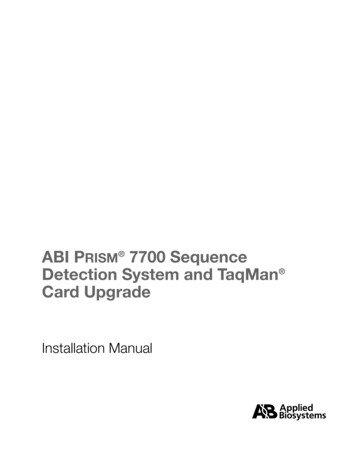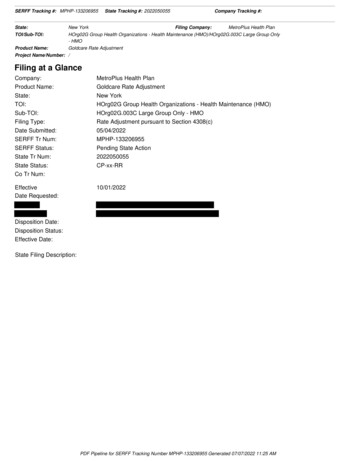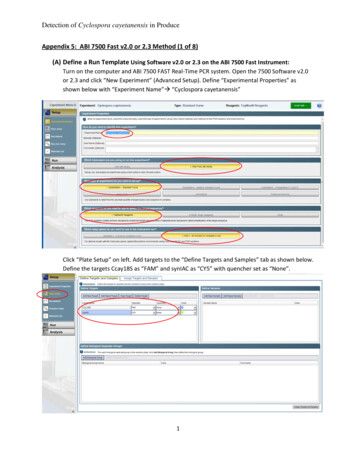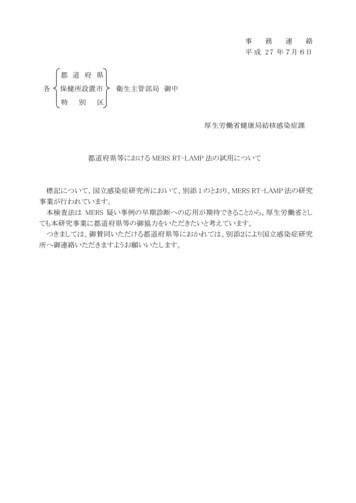Transcription
ABI Policy & Good Practice Guide - GPS Electronic Tracking Devices (post GDPR v 1.0) - 2019-11-18THE ASSOCIATION OF BRITISH INVESTIGATORSPOLICY & GOOD PRACTICE GUIDEUSE & DEPLOYMENT OF GLOBAL POSITIONING SYSTEM (GPS) ELECTRONIC TRACKING DEVICESCONTENTSChapterTitlePagePART APOLICY2Use & deployment of global positioning system (GPS)electronic tracking devicesPART BGOOD PRACTICE GUIDE3 - 12Use & deployment of global positioning system (GPS)electronic tracking devices1Introduction & Copyright32Purpose & Disclaimer43GPS Electronic Tracking Devices54The Regulation of Investigatory Powers Act 200065The Data Protection Act 20187-86Trespass97Harassment & Stalking108Human Rights Act 199811www.theABI.org.uk
ABI Good Practice Guide & Policy - GPS Electronic Tracking Devices - 2019-11-18Page 2 of 11PART ATHE ASSOCIATION OF BRITISH INVESTIGATORSPOLICYUSE & DEPLOYMENT OF GLOBAL POSITIONING SYSTEM (GPS) ELECTRONIC TRACKING DEVICES(INVESTIGATIONS IN THE PRIVATE SECTOR)1.LAWFUL - All surveillance activities should be lawful, that is justified, accountable, proportionate (andreasonable), appropriate, necessary (JAPAN).2.DPIA – Whether by the investigator or the client, a Data Protection Impact Assessment must becarried out prior to considering any investigation and this applies too prior to considering deploying1a GPS Electronic Tracking Device .3.CONFIDENTIALITY –3.1. A GPS Electronic Tracking Device is a covert surveillance aid and its use / deployment shouldbe treated with respect and strict confidentiality.3.2. No reference to the use or deployment of a GPS Electronic Tracking Device needs to orindeed should be made outside the confidentiality of the client and surveillance deployingoperatives.3.3. Under no circumstances must GPS Electronic Tracking Device data records or softwareaccess (log-in details to access the mapping programme) be provided to the client or anyoneoutside the surveillance team.3.4. Details of the data gathered with the aid of a GPS Electronic Tracking Device should in theinterests of both transparency and compliance, be recorded and retained by the investigatorafter every surveillance deployment.4.PRIVATE LAND - At no time should a GPS Electronic Tracking Device be deployed on private landwithout the proprietor’s permission. A device may only be deployed when the subject vehicle is in aplace to which the public have legitimate access, whether on payment or otherwise.5.PHYSICAL SURVEILLANCE AID –5.1. Save in exceptional evidence gathering circumstances, a GPS Electronic Tracking Devicemust only be used in conjunction and as an aid to physical surveillance.5.2. Any data obtained from a GPS Electronic Tracking Device is a covert aid to the physicalsurveillance - the data is to be used and classified as ‘intelligence only’ and should not becommunicated or introduced as unsupported ‘evidence’ in any investigation6.DATA LOGs - The data logs produced by a GPS Electronic Tracking Device should not form the solebasis of any evidential statement, or report.7.PUBLICATION OF USE / DEPLOYMENT –7.1. The use and deployment of GPS Electronic Tracking Devices is covert and therefore aninvestigator should not openly advertise their use or availability other than in hardware orsoftware sales, without reference to compliance with this Policy.7.2. For the avoidance of doubt requests for the deployment or recovery of such devices must notbe made in any group forum, ABI or otherwise, outside the confines of the surveillance team.7.3. A GPS Electronic Tracking Device is a covert aid to physical surveillance and any reference totheir availability, use or deployment should be qualified to be compliant with this Policy.THE POLICY SET OUT ABOVE IS BINDING ON THE MEMBERSHIP OF THE ABI.1Data protection impact assessment narrative
ABI Good Practice Guide & Policy - GPS Electronic Tracking Devices - 2019-11-18Page 3 of 11PART BTHE ASSOCIATION OF BRITISH INVESTIGATORSGOOD PRACTICE GUIDEUSE & DEPLOYMENT OF GLOBAL POSITIONING SYSTEM (GPS) ELECTRONIC TRACKING DEVICES(INVESTIGATIONS IN THE PRIVATE SECTOR)1.INTRODUCTION & COPYRIGHT1.1. Formed in 1913, The Association of British Investigators (ABI) has been upholdingprofessional standards for over a century. The ABI campaigns tirelessly for regulation forinvestigation in the private sector and promotes excellence, integrity and professionalismwithin its membership. The ABI has become the kite mark for the investigation industry.1.2. The utilisation of GPS Electronic Tracking Devices on vehicles by private sectorinvestigators is often discussed and there are many misunderstandings.1.3. In January 2012 the Information Commissioner’s Office (ICO) written evidence to theParliamentary Home Affairs Select Committee stated that the ‘ICO would support any2industry initiatives aimed at promoting informational best practice amongst investigators’(see Summary of ICO evidence).This Policy & Guide, one of several published by the ABI, followsthat invitation.1.4. It is the ICO view that the deployment GPS Electronic Tracking Devices as a surveillancetool may constitute processing personal data within the meaning of the General DataProtection Regulation (GDPR) and Data Protection Act 2018 (DPA). The ABI accepts thisview, however, there is no specific government-sponsored regulation to assist privatesector investigators with regards to the use and deployment of GPS Electronic TrackingDevices.1.5. It is essential for any investigation that involves the processing of personal data that theclient provides the lawful basis for commissioning the investigation. To reach that point3the investigator carries out and records a data protection impact assessment . It isusual for investigators to rely largely on the client’s “Legitimate Interest” providing itoutweighs the data subject’s rights under the GDPR.1.6. Copyright of this Guide and Policy is vested in the ABI, except where otherwiseacknowledged, and no part of this document shall be copied, printed or distributed by wayof photographs, printed matter, website, e-mail or in any other manner without expresspermission from the 01012/cmselect/cmhaff/writev/1800/m08.htmData protection impact assessment narrative
ABI Good Practice Guide & Policy - GPS Electronic Tracking Devices - 2019-11-18Page 4 of 112.PURPOSE & DISCLAIMER2.1. The ABI believes that this policy will give professionally minded and responsibleinvestigators in the private sector a clear understanding of the use and deployment ofGPS Electronic Tracking Devices where the vehicle-owner’s consent is not present.2.2. The Policy set out in section A above is specifically aimed at ABI members who arebound by the ABI Code of Ethics & Professional Standards and accountable to abide byABI Policies. This is demonstrated by the ABI’s robust and independently adjudicateddiscipline process that could see substantiated evidence of an ABI member breachingthis Policy face expulsion from the ABI.2.3. The contents of this Guide are intended as helpful but not legal advice and the ABI doesnot warrant or make any representations regarding the correctness, accuracy or reliabilityof the comments and observations in this publication. Readers of the Guide shouldobtain their own independent legal advice on any matter referred to in the Guide and besatisfied as to the legal position should they consider using or deploying a GPS ElectronicTracking Device.
ABI Good Practice Guide & Policy - GPS Electronic Tracking Devices - 2019-11-18Page 5 of 113.GPS ELECTRONIC TRACKING DEVICES3.1. A GPS Electronic Tracking Device is normally carried by a moving vehicle or person. Thedevice relies on the Global Positioning System to determine and track its precise locationwithin a relatively small area sufficient to enable the operator (surveillance operative) todetermine the likely geographic address (locality) of the device and the vehicle undersurveillance.3.2. The recorded location data can be stored within the GPS Electronic Tracking Device, or itmay be transmitted to a central location database. This allows the device’s location to bedisplayed against a map backdrop either in real time or when analysing the data later,using GPS Electronic Tracking Device software (recorded history of devicelocality/movement).3.3. GPS Electronic Tracking Devices provide intelligence on the movement of an object andparticularly on a living person. They are not too dissimilar to one person actually followinganother person (‘subject’) and are an extension of that capability, as is using a camera tocapture what you see.3.4. Any data or information collected by the use of a GPS Electronic Tracking Device shouldnever be considered in isolation as ‘evidence’ and introduced into the evidential chainwithout corroborated evidence. The data merely supports the location of a vehicle, thedetails of which would be corroborated by physical surveillance.
ABI Good Practice Guide & Policy - GPS Electronic Tracking Devices - 2019-11-18Page 6 of 114.THE REGULATION OF INVESTIGATORY POWERS ACT 20004.1. The Regulation of Investigatory Powers Act 2000 (RIPA) only applies to public bodies andis intended to provide safeguards in the manner in which evidence to support aprosecution is obtained.4.2. RIPA does apply to private investigators that are working for a public body that is coveredby the legislation (e.g. local authorities, the Environment Agency etc) and the directed4surveillance being conducted requires RIPA authority. Since 2012 local authoritiesrequire judicial authority for directed surveillance (local authorities cannot authorise5intrusive surveillance under RIPA).4.3. In the deployment and use of a GPS Electronic Tracking Device the ABI encouragesRIPA compliance in the private sector as good practice. Save in exceptional evidencegathering circumstances, this will be achieved by only utilising the device as a covert aidto physical surveillance.4.4. RIPA compliance would demonstrate that every attempt was made to deliver evidencewithin ‘the spirit of the Act’ in order to minimise the possibility of such evidence later beingruled as inadmissible under such legislation as Section 78 of the Police and CriminalEvidence Act 1984 (PACE) or Article 8 of the Human Rights Act 1998 (HRA) – ‘Right toRespect for Private and Family Life’, during any subsequent resulting litigation.4.5. Every effort should be made to comply within the provisions of RIPA during all aspects ofthe proposed operation including any periods of directed surveillance.4.6. There is no current legislation that prevents the use of a GPS Electronic Tracking Device(for example on a vehicle) by an investigator in the private sector, without the consent ofthe owner or user of that vehicle, providing that the physical surveillance it’s use supports6is lawful with JAPAN (mnemonic) applied and the processing of such personal datacaptured in its use complies with the GDPR. The investigator usually relies on the client’sLegitimate Interest outweighing the rights of the data subject. It is at the very least goodpractice for the investigator to carry out a documented data protection impact assessmentto include the assessed lawful basis on which the client relies to commission theinvestigation.4.7. Reference is made at Section 26 (4) RIPA - which states:For the purposes of this Part, surveillance is not intrusive to the extent that — It iscarried out by means only of a surveillance device designed or adapted principallyfor the purpose of providing information about the location of a vehicle.4.8. It follows therefore that surveillance using a GPS Tracking Device is considereddirected surveillance under RIPA.4Directed surveillance is covert, but not intrusive surveillance; it is conducted for the purposes of a specificinvestigation or operation; it is likely to result in the obtaining of private information about a person (whether or notone specifically identified for the purposes of the investigation or operation)5Intrusive surveillance is covert surveillance that is carried out in relation to anything taking place on residentialpremises or in any private vehicle, and that involves the presence of an individual on the premises or in the vehicle oris carried out by a means of a surveillance device.6JAPAN – justified, accountable, proportionate (and reasonable), appropriate, necessary
ABI Good Practice Guide & Policy - GPS Electronic Tracking Devices - 2019-11-18Page 7 of 115.THE DATA PROTECTION ACT 2018th5.1. The Data Protection Act 2018 (DPA) came into force on 25 May 2018 and replaced thestData Protection Act 1998, which came into force on 1 March 2000. DPA made it anoffence to unlawfully obtain or disclose personal data (s.170, previously s.55 of the 1998Act).5.2. The DPA applies to personal data held in all formats, whether electronic, paper, audio,visual or digital records.5.3. Processing, under the terms of the DPA, covers all conceivable manipulations of personaldata including collection, use, storage, disclosure and amendment.5.4. Mere possession of such data amounts to processing.75.5. The DPA sets out what may or may not be done with personal data .5.6. Any business, which determines the manner and the purpose personal data is processed,must be registered as a Data Controller with specific purposes, with the ICO and have aDPA notification number.5.7. As stated above, the ICO expresses the view that data obtained from a GPS ElectronicTracking Device identifies the individual (within the vehicle) or his activities and it istherefore personal data within the meaning of the DPA.5.8. However, even though the use of a GPS Electronic Tracking Device may be processingpersonal data where it records the movements of an individual, the ABI does not considertheir use in within the terms of this ABI Policy & Guide is unlawful.5.9. If a GPS Electronic Tracking Device is deployed purely as an aid to physical surveillance,then any personal data that is gathered would be no different from that which would havebeen gathered without it. The following example is given using the simplest of scenarios:5.9.1.In contemplation of matrimonial proceedings, an investigator is tasked to verify the client'ssuspicion that the spouse (the ‘data subject’) is committing adultery and to further explorewhether the subject may be possessed of assets the client may not be aware of.5.9.2.It is decided that physical surveillance is lawful and meets the JAPAN (mnemonic) toconfirm or deny the suspicion.5.9.3.The investigator follows the data subject and notes the data subject calls into a bank andlater meets with a female in a car park who gets into the subject’s vehicle and where theyare observed engaged in inappropriate behaviour, which the investigator records withcamera or video footage. The female then leaves and the investigator follows her to anaddress, which the investigator researches from public, or shared registers and identifiesthe female.5.10. The physical surveillance probably identified the location of where the subject holds abank account (either known or unknown to his wife) and revealed that the subjectappears to be having a clandestine (improper) relationship, which has been recorded. Ifthe GPS Electronic Tracking Device had been deployed without the physical surveillanceit would not have identified the above. The log for the physical surveillance would notethe female’s vehicle and home address and subsequent research would identify her.7Personal data means data which relate to a living individual who can be identified (a) from those data, or (b) fromthose data and other information which is in the possession of, or is likely to come into the possession of, the datacontroller, and includes any expression of opinion about the individual and any indication of the intentions of the datacontroller or any other person in respect of the individual. It is important to note that, where the ability to identify anindividual depends partly on the data held and partly on other information (not necessarily data), the data held will stillbe “personal data”.
ABI Good Practice Guide & Policy - GPS Electronic Tracking Devices - 2019-11-18Page 8 of 115.11. In the circumstances described above the investigator had not done anything unlawfuland the data gathered, if used correctly and for the purpose for which it was obtained,would not breach the DPA or other regulation.5.12. Adding a GPS Electronic Tracking Device (as a tool to assist the physical surveillance)does not alter anything other than recording the data (locality movements of the vehicle).5.13. Whilst it could be argued that the above physical surveillance could have been conductedwithout the aid of a GPS Electronic Tracking Device, it is fair to counter argue that withoutthe device the prospects of losing the data subject are increased and it also diminishesthe risk of committing moving road traffic offences.
ABI Good Practice Guide & Policy - GPS Electronic Tracking Devices - 2019-11-18Page 9 of 116.TRESPASS6.1. A civil trespass to land occurs where a person directly enters upon another's land withoutpermission, or remains upon the land, or places or projects any object upon the land.This tort is actionable per se without the need to prove damage. Walking onto landwithout permission, or refusing to leave when permission has been withdrawn, orthrowing objects onto land are all example of trespass to land.6.2. A civil trespass, however, is not a crime.6.3.It may be a civil trespass to deploy a GPS Electronic Tracking Device onto a vehicle notbelonging to you or your client but in a 2007 restricted report given by the Office of8Surveillance Commissioners (OSC) , the OSC’s Chief Surveillance Commissioner, SirChristopher Rose, stated ‘putting an arm into a wheel arch or under the frame of a vehicleis straining the concept of trespass’.6.4. The judiciary has described this concept of trespass as ‘de minimis’ (the law cares not for9small things) and would not countenance a complaint.6.5. This could be further bolstered if the investigator could provenance the lawfulness of thesurveillance and demonstrate integrity in addition to having applied JAPAN (mnemonic).6.6. However, on the basis as recommended above that investigators in the private sectorshould be RIPA compliant, to enter the private land of anyone in order to deploy a GPSElectronic Tracking Device would be moving away from directed surveillance andexceeding the acceptable boundaries of RIPA and the human rights regulations. This isunacceptable practice and contrary to the ABI Policy.6.7. Surveillance from a common area is not intrusive surveillance due to the definition of‘residential premises’. Under RIPA (Part II), surveillance is not intrusive to the extent thatit is carried out by means only of a surveillance device designed or adapted principally forthe purpose of providing information about the location of a vehicle. As long as thedevice is supported by physical surveillance the device will do no more than give alocation of the vehicle corroborated by physical surveillance and the direct evidence ofthe investigator(s). Evidence of the location of a vehicle at a specific location at aspecified date and time on private land would be provided by the investigator(s) andsupported by their choice of -on-privateproperty-report-shows.html9For example, an act that is technically an infringement can be called de minimis if it is thought to be outside thepurpose of the law to catch it; the claim can then be dismissed with costs.
ABI Good Practice Guide & Policy - GPS Electronic Tracking Devices - 2019-11-18Page 10 of 117.HARASSMENT & STALKING7.1. Surveillance in all of its forms can sometimes be misinterpreted by the public as stalking.7.2. Stalking is a term used to describe a particular kind of harassment. Generally, it is usedto describe a long-term pattern of persistent and repeated contact with, or attempts to10contact, a particular victim. Recent legislation criminalises this form of harassment .7.3. Examples of the types of conduct often associated with stalking include: directcommunication; physical following; indirect contact through friends, work colleagues,family or technology, or, other intrusions into the victim’s privacy. The behaviour curtailsa victim’s freedom, leaving them feeling that they constantly have to be careful.7.4. In many cases, the conduct might appear innocent (if it were to be taken in isolation), butwhen carried out repeatedly so as to amount to a course of conduct, it may then causesignificant alarm, harassment or distress to the victim.7.5. If the subject of enquiry is aware of the surveillance, then this may amount to harassmentunder the Protection from Harassment Act 1997.7.6. It is also possible that if the subject of enquiry becomes aware of a GPS ElectronicTracking Device, this may amount to harassment under the Protection from HarassmentAct 1997 if those deploying the device pursue a course of conduct:7.6.1.Which amounts to harassment of another, and7.6.2.Which he knows or ought to know amounts to harassment of the other.7.7. Conducting any surveillance should only be contemplated based on the guidanceprovided within the legislation enacted to control the covert activities of public bodies suchas police, government agencies etc. RIPA.7.8. Therefore using a GPS Electronic Tracking Device without contemplating the needfor manned surveillance may be construed as harassment / stalking or evenvoyeurism in some cases.10Protection from Harassment Act 1997 n/2A
ABI Good Practice Guide & Policy - GPS Electronic Tracking Devices - 2019-11-18Page 11 of 118.HUMAN RIGHTS ACT 1998 (HRA)8.1. For professional clients the principal consideration in the use of a GPS ElectronicTracking Device is likely to be reputational in that whilst their use is lawful, there is awidely held view, that it could be considered distasteful, underhand or unethical.8.2. There is only ever a need for public authorities to consider RIPA authorisation where thecovert surveillance is likely to breach Article 8 of HRA and a criminal prosecution iscontemplated.8.3. Police may use a GPS Electronic Tracking Device deployed on the exterior of a vehiclebut must have a warrant to place one inside a vehicle. Intrusive surveillance is covertsurveillance in residential premises or private vehicles where someone would have agreater expectation of privacy than in a public place. The surveillance is intrusive if itinvolves the presence of either an individual or a surveillance device on the premises orinside the vehicle. It does not include a tracking device fitted to the vehicle’s exterior ‘The use of a mere tracking device does not equate to intrusive surveillance as it isexcluded from the definition’.8.4. Jones v Warwick8.4.1. Anyone could breach the human rights of another. The case on this is forinvestigators that of Jean F Jones v University of Warwick (2003) - Whilst the videofootage was admitted into evidence, as it went to disprove the claim, the deceptionperpetrated by the investigators was held by the court to amount to a breach of theclaimant’s human rights.8.4.2. By virtue of Section 6 of the HRA only public authorities are prohibited from actingincompatibly with the Act. The Court is a public authority but insurance companiesand investigators in the private sector patently are not (unless acting as agents for aPublic Authority). The Court, however, would consider the HRA when weighing upthe evidence.8.4.3. In the above case, investigators, acting on behalf of an insurer gained useful videofootage of the claimant, the investigators having tricked their way into her houseusing a pretext. The Court criticised the tactics of the investigators, particularlyaround the trespass to land, but it did not, and could not, rule that the investigatorshad breached HRA. The matter before the Court was about the admissibility insubsequent proceedings of the evidence obtained. The Court dismissed that claim.The potential significant impact of this case is worthy of greater scrutiny whenconsidering the human rights position on deploying a GPS Electronic TrackingDevice. A useful article on the case was written by Barrister, Rosalind English, 111Crown Office Row .11http://www.preview2.1cor.enstar.net/1315/?form 1155.replyids 818
ABI Good Practice Guide & Policy - GPS Electronic Tracking Devices - 2019-11-18 Page 2 of 11 PART A THE ASSOCIATION OF BRITISH INVESTIGATORS POLICY USE & DEPLOYMENT OF GLOBAL POSITIONING SYSTEM (GPS) ELECTRONIC TRACKING DEVICES (INVESTIGATIONS IN THE PRIVATE SECTOR) 1. LAWFUL - All surveillance activities should be lawful, that is justified, accountable, proportionate (and










